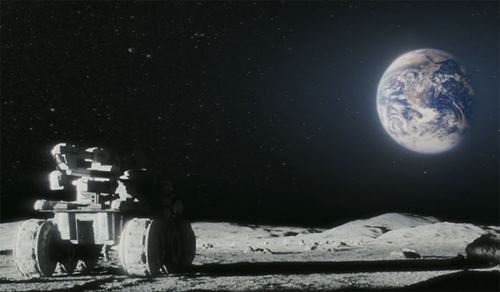Manned space shuttle missions are over for the time being. Instead, the few sentinels of space exploration are sent out alone without human accompaniment. Robots like the Mars rover Curiosity do the roaming for us, sending data samples back to us without any expectation of gratitude.
Space oddity

Manned space shuttle missions are over for the time being. Instead, the few sentinels of space exploration are sent out alone without human accompaniment. Robots like the Mars rover Curiosity do the roaming for us, sending data samples back to us without any expectation of gratitude.
Soulless automatons or not, it’s hard not to feel a little sorry for them, all alone, plugging away day after solar day.
In Duncan Jones’ film Moon, which is screening this week at Portland State’s 5th Avenue Cinema, Sam Rockwell’s character (also named Sam) has a lot in common with Curiosity.
Sam works alone on the dark side of the moon in an unspecified future year, harvesting helium-3 for its vast energy potential and sending it back to Earth. Nearing the end of his three-year contract, Sam seems on edge. He’s resorted to talking to his plants.
Sam’s only real companion is Gerty, the coffee-stained, ceiling-mounted computer voiced by Kevin Spacey. Gerty reminds us of 2001: A Space Odyssey’s 9000, though he bears an unassuming yellow smiley face instead of an imposing red dot.
The dulcet-voiced Spacey gives us his best GPS impersonation, speaking with just enough inflection to make us wonder if we’re imagining emotion.
Life is simple aboard the art deco station (again, echoes of 2001) until Sam crashes his vehicle on a routine trip to grab some helium-3 from a harvester on the lunar surface. Something seems funny when he wakes up, apparently saved by Gerty.
Though the movie originally came out in 2009, to say more would be a spoiler—it would be a crime to deprive you of Moon’s initial journey of discovery.
This is the first film by Jones, son of interstellar rock god David Bowie. Jones eschews contemporary action-packed sci-fi movie tropes in favor of a more cerebral approach. Sam isn’t the last great hope of the human empire, nor is he stalked by a terrifying alien creature. In fact, Sam is the only person the viewer actually sees inside of his station for the entire film.
In a certain light, Moon bears a bit of a similarity to the Tom Hanks film Castaway: Sam is on an island of his own, with no one but himself for company. The trials he goes through are more mundane but, in a way, not any less about survival.
Rockwell is put through the ringer in numerous ways, but he always stops short of chewing scenery. It would be easy to go off the rails into space madness territory, but Jones and Rockwell reign Sam in just enough to be believable while still leaving a lasting impression of a man at his wit’s end.
Even leading up to its climax, Moon moves along at a leisurely pace. No matter the urgency of the film’s impending revelations, Jones always adds a few beats between shots. A pensive expression. A few extra steps in a moonwalk. A stilted computation between robotic responses.
These pregnant pauses allow the viewer time to take in the mood—time to mind the gaps. Moon ends with much of its plot wrapped up neatly, but these are the types of moments that linger in your mind when you’re in bed at night, alone.
Composer Clint Mansell isn’t known for his sci-fi scores, outside of last year’s video game Mass Effect 3. Though he’s worked on high-profile films as recently as 2010’s Black Swan, most know Mansell for his unmistakable score for Requiem for a Dream.
The crescendos in Moon aren’t quite as bombastic but at times build to a manic and satisfying intensity. More often than not, the simple soft strokes of Mansell’s piano are enough to evoke a sense of paranoia and isolation.
Moon is one of those movies that everyone will see a little differently. Many have talked at length about the film’s exploration of the soul and what it means to be human (Sam’s last words to Gerty are particularly stirring).
Moon (2009)
Jan. 19 and 20, 7 p.m. and 9:30 p.m.
Jan. 21, 3 p.m.
$3 general admission; free for students
Personally, I found myself fascinated with the fantastical and ultimately ultra-ordinary job of what is essentially a security guard protecting a building with no possibility of a break-in.
Throughout the film, we see Sam exchanging video messages with his wife and new daughter. This is his finish line, his reason for being, what drives him to finish his three-year contract.
When Moon puts Sam’s goal into question, it leaves him (and us) wondering where else he could possibly go. What if there really isn’t anything at the end of the rainbow except for yet another rainbow?
Even if you’ve seen it before, it might be worth taking in Moon again this week. The film thrives on repeat viewings: With the big mystery gone, there’s nothing to ponder but the big questions.
If you don’t have anyone to go with, don’t worry. Movies like Moon are sometimes best seen in the dark, with no one else but yourself.





